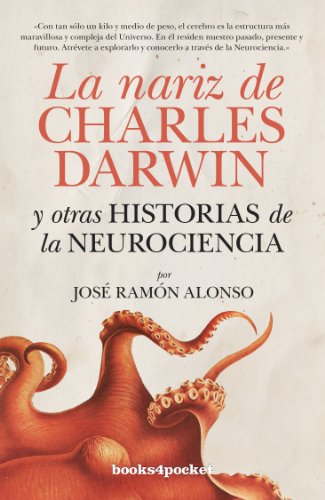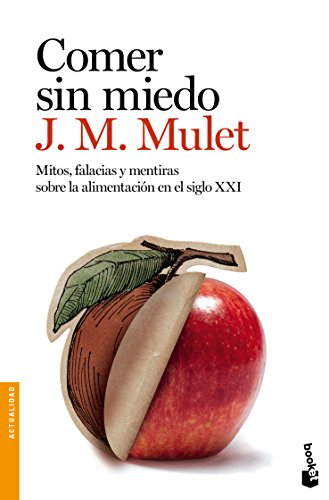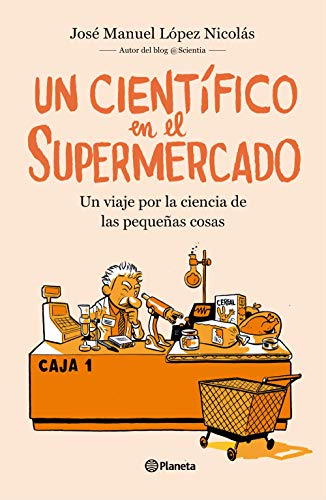
Yes in The 36 best science books to change the way you see the world we focused on basically Anglo-Saxon authors, Here we are going to focus on some of the best Spanish science communicators.
That doesn't make them better or worse, and it may not make them different in many cases, but perhaps there is something in the writing style, the idiosyncrasy, the culture... that is worth taking into consideration. In any case, by reading them you will also be supporting the increasingly robust health of Spanish dissemination.
Charles Darwin's Nose, by José Ramón Alonso
We are probably facing the most prolific Spanish author of all I know. Choosing one of his books is impossible, because they are all excellent, and he also talks about very, very different things, and with different approaches.
I choose this book because it is the first one I read by him, the one that made me discover him as an author, and it is also ideal to start because it is a kind of compilation of articles on very diverse topics... all of them capable of making you dilate your eyes in amazement.

Charles Darwin's nose: and other stories from Neuroscience (Essay and Dissemination)
Nuclear energy will save the world, by Alfredo García
Alfredo is the Tony Stark of nuclear energy, the Tony Manero of radioactivity, the Tony Montana of Greenpeace... well, his name is not Tony, but Alfredo, and he is the already mythical @NuclearOperator on Twitter, and a nuclear operator in real life, specifically at the Ascó Nuclear Power Plant, in Tarragona.
A necessary book. A book that we must protect. Because when it comes to nuclear energy, as in many other issues, information must prevail over indoctrination, fear and Manichean messages, those that fit comfortably on a claim sheet. Because if we want a more ecological world we need a more nuclear world. By the way… Did you know that eating a banana produces a higher radioactive dose than living for a year next to a nuclear power plant?

Nuclear Energy Will Save the World: Debunking Myths About Nuclear Energy (Non-Fiction)
The left Feng-Shui, by Mauricio-José Schwarz
The scientific method is the most refined procedure to reach levels of empirical knowledge that are difficult to achieve by any other intellectual means.
Many people, however, prefer to be led by hunch, by the fallacy of authority, by amimefunctionism. A weak thought that has taken root, above all, in humanities universities as a result of the May 68 (The Social Text affair highlights the extent of intellectual degeneration we have reached, where what is confusing and cryptic, false, is rewarded over what is expressed clearly and supported by proof and evidence).

The feng-shui left: When science and reason stopped being progressive (Ariel)
The Ignored Kingdom, by David González Jara
Humans feed on more than 5,000 different species, and 18,000 of them have medicinal purposes. The 21% of all of them, however, is in danger of extinction, mainly due to climate change, habitat loss, diseases and invasive species. Plants are fascinating, yes, and David G. Jara He manages to infect us with that fascination through his prose.

The Ignored Kingdom: A Surprising Insight into the Wonderful World of Plants
May mathematics be with you!, by Cara Grima
Mathematics surrounds us, penetrates us and holds the galaxy together. They are in almost everything you do, from tying your shoes to that selfie in which you looked so good, to auctions, football, vaccines, Game of Thrones or Google. And no one better than the enthusiastic, funny and sparkling Clara Grima to get into them.

May mathematics be with you! (Ariel)
Eat without fear, by JM Mulet
We live in times of chemophobia. While we seek the latest technology, in the field of food we reject it, and prefer food "made by grandma", "natural", "organic", "biological". However, natural is not necessarily healthier than chemical. In fact, the difference between natural and chemical is diffuse.
The difference between natural and artificial is diffuse because nature does not feed us. Most societies that live "in nature" have nutritional deficiencies. Most of the things we eat only exist thanks to human intervention. All the species that feed us have been selected, bred and domesticated.

Eat without fear: Myths, fallacies and lies about food in the 21st century (Dissemination)
A scientist in the supermarket, by José Manuel López Nicolás
This impressive book is a mundane tour of everything that surrounds us, bringing out with a scientific prism what is worth highlighting, corroborating or questioning. More than a book, furthermore, we are faced with a dialogue in which the author, like a cicerone, shows us all the wonders that surround us on a daily basis. And that everything is, in a way, connected to everything. For example, in one chapter he reaches pull the beet thread, revealing the nature of dyes, or even what all this has to do with the International Space Station.
The dialogue, furthermore, is not with the reader, that too, but with his daughter Ruth, his grandmother and other characters that surround the author and who add, even more, an endearing aspect to the text.

A scientist in the supermarket: A journey through the science of small things (Non-Fiction)
The naked eye, by Antonio Martínez Ron
The first thing you think of when reading this book is “organic.” How well everything is cohesive. It is almost like reading a novel, rich and full of characters, but completely real... a journey that goes from the very origin of the looks to the way in which we try to observe the confines of the universe. Everything we see, everything we can't see, everything we can see. In short, an exquisite book.

The Naked Eye: If you don't see it, how do you know it's there? The fascinating journey of science beyond the apparent (Drakontos)
Your vitamins are gone!, by Deborah García Bello
Anti-vaxxers tend to be very informed people. There are doctors who even prescribe homeopathy. Pseudoscience courses are taught in universities. And even the most cultured and informed person forms completely wrong ideas about the natural world. And precisely for this reason, books like this one, which explain why there is no difference between white and brown sugar, that electromagnetic waves from cell phones are harmless or that there is no such thing as a healthy glass of wine, resorting to reliable sources such as studies. scientists, should always be on the best-seller podium of any bookstore.

Your vitamins are going away!: Myths and secrets that only science can solve (Disclosure)
You can discover these and other books about Spanish authors in the next video:
–
The news
The best science books written by Spanish authors that you should not miss
was originally published in
Xataka Science
by
Sergio Parra
.
